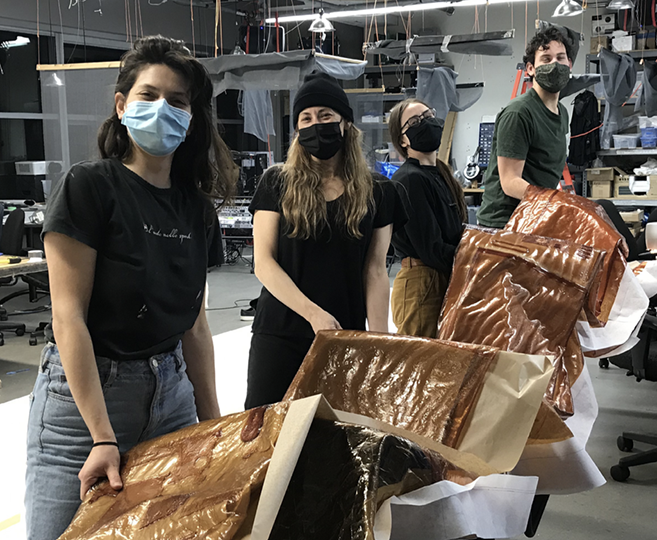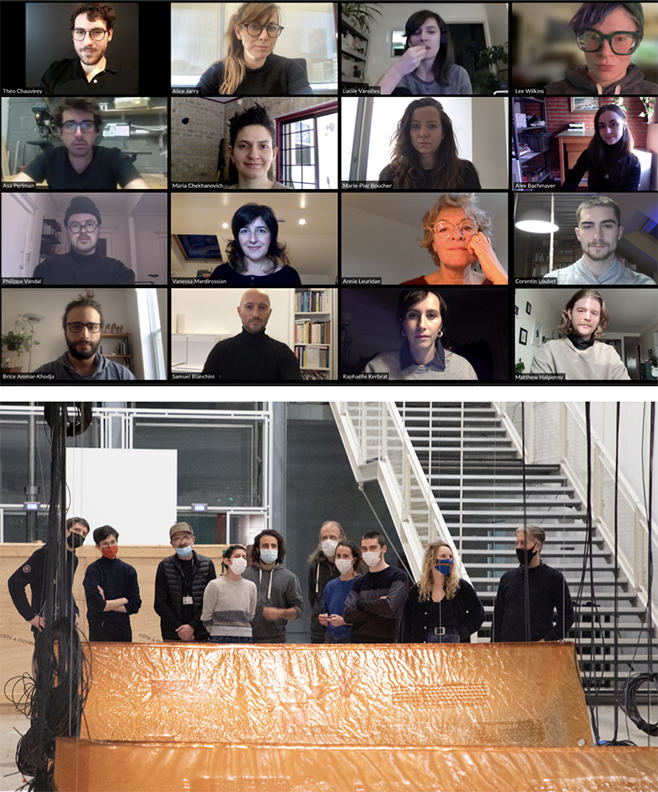Research-Creation: Milieus without Borders at 4S
October 6-9, 2021
Alice Jarry, Marie-Pier Boucher, Brice Ammar-Khodja, and Lee Wilkins present the panel ‘’Research-Creation: Milieus without Borders’’ at the Society for Social Study of Science Conference in Toronto.

What can membranes teach us about good relations?
Membranes facilitate and prevent exchanges between and among milieus. Membranes take many forms and temporalities: they testify to the origins of cellular life; they enable movement and flux; they are opened to external pressure; they consume and produce energy; they metabolize. Membranes are also sites of containment, struggles, wars, and borders. Membranes capture, imprison, eat, digest, and eliminate. This panel will explore the notion of membrane as a concept, a technical object, a site, a trope, and a living analogy. It will explore the regimes of visibility, economies of collaborations, and politics of manufacturing that condition the ways in which a membrane can act as a catalyst for the creation of a milieu, rather than as the border for the protection of a claimed/owned territory.
The discussion will focus on a research-creation project, Membranes in Action, and more specifically on one of its concrete instantiations, the art installation Fossilation, recently exhibited at the Pompidou Center.
Membranes facilitate and prevent exchanges between and among milieus. Membranes take many forms and temporalities: they testify to the origins of cellular life; they enable movement and flux; they are opened to external pressure; they consume and produce energy; they metabolize. Membranes are also sites of containment, struggles, wars, and borders. Membranes capture, imprison, eat, digest, and eliminate. This panel will explore the notion of membrane as a concept, a technical object, a site, a trope, and a living analogy. It will explore the regimes of visibility, economies of collaborations, and politics of manufacturing that condition the ways in which a membrane can act as a catalyst for the creation of a milieu, rather than as the border for the protection of a claimed/owned territory.
The discussion will focus on a research-creation project, Membranes in Action, and more specifically on one of its concrete instantiations, the art installation Fossilation, recently exhibited at the Pompidou Center.
Research-creation is a methodology that poses problems to the politics of knowledge production by problematizing “issues through practice,” and by addressing the “critical grasp of the process” (SSHRC). Situated half-way between an “institutional operator” and a technique, that is, it is half-way between “a mechanism for existing practices to interface with the neoliberalization of art and academics” (Massumi & Manning, 2014) and a practice capable of overspilling this troubling alignment.
Fossilation will thus be problematized as a as method, a practice, and a technique capable of resisting the professionalization and instrumentalization of artistic activity, on the one hand, and the “prototyping of new forms of collaborative activity,” (Massumi & Manning, 2014) on the other. The shared objective will be to render visible the social, aesthetic and political dimensions necessary to resist the transformation of milieus into borders. The panelists, whose profiles range from STS, arts & design, engineering and media studies, will discern the social and political implications of this creative process by mobilizing a variety of techniques: architectural renderings, drawings, sketches, as well as audio-visual materials.
Fossilation will thus be problematized as a as method, a practice, and a technique capable of resisting the professionalization and instrumentalization of artistic activity, on the one hand, and the “prototyping of new forms of collaborative activity,” (Massumi & Manning, 2014) on the other. The shared objective will be to render visible the social, aesthetic and political dimensions necessary to resist the transformation of milieus into borders. The panelists, whose profiles range from STS, arts & design, engineering and media studies, will discern the social and political implications of this creative process by mobilizing a variety of techniques: architectural renderings, drawings, sketches, as well as audio-visual materials.



